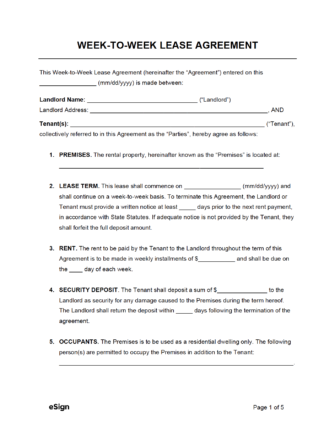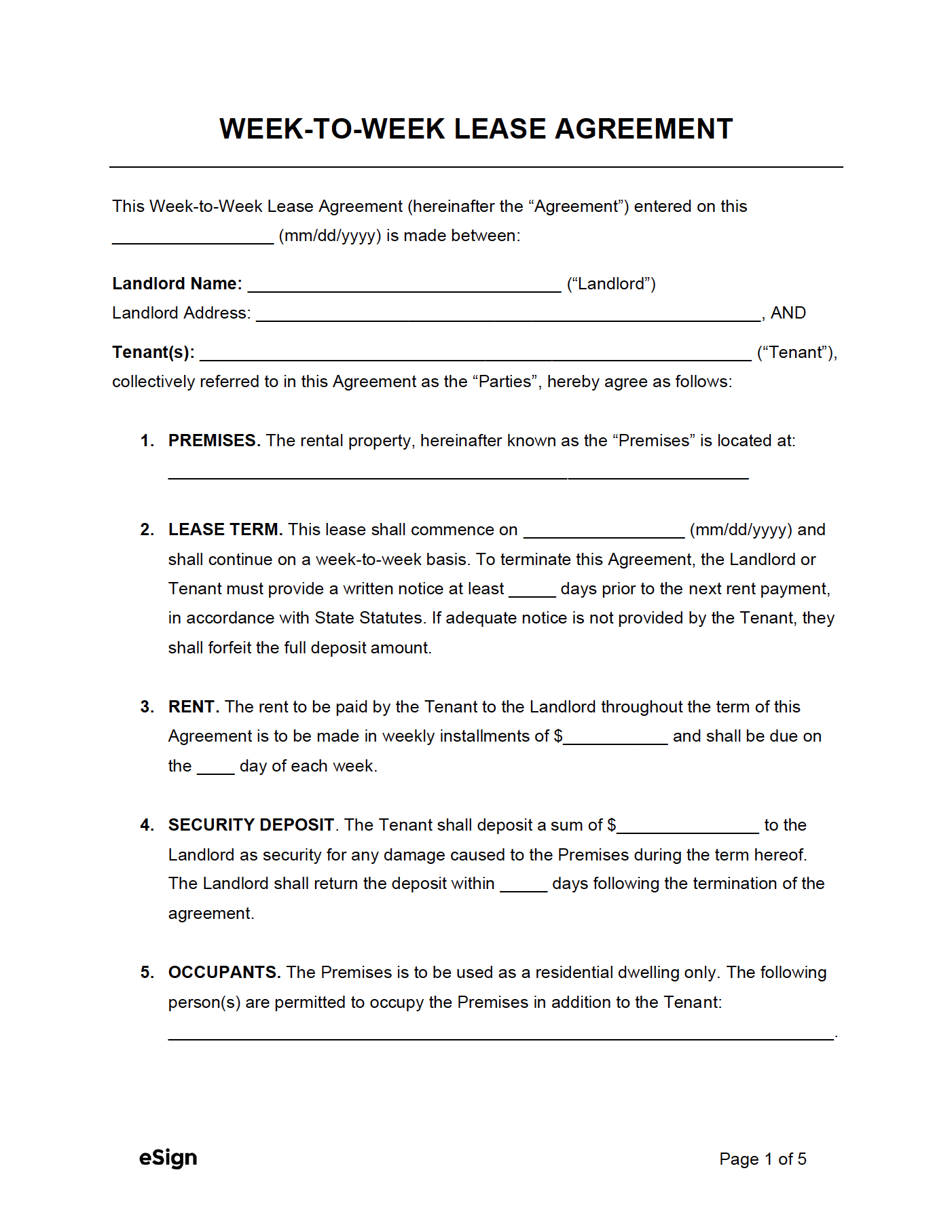Common Uses
It is commonly used for short-term rental arrangements such as vacation, work, or off-season purposes.
Pros & Cons
| PROS | CONS |
| Income is usually higher; sometimes two (2) times more compared to standard leases. | Increased turnover, leading to landlords having to find multiple tenants within very short periods of time. |
| Better flexibility; like tenants, landlords can terminate the contract with minimal notice and for almost any reason. | Local and state laws pertaining to short-term leases are often stricter and more regulated than standard lease arrangements. |
| Marketing options, like AirBnb and VRBO, are often better exposure and creating listings is inexpensive. | Due to the high volume of tenants, it’s likely that landlords will have to spend more time cleaning and fixing up their rental units. |
What to Include (8)
- Party Information – The names and addresses of both parties.
- Property Address – The physical mailing address of the property.
- Rent ($) – The weekly rent amount.
- Notice – The amount of time that must be given by either party to end the lease.
- Security Deposit – The dollar ($) amount of the deposit tenants are required to pay upfront in case damages occur.
- Utilities – A list of utilities, such as water, electricity, cable, etc., and which party will pay for which service.
- Guests – The number of occupants that will be staying on the property and their full names.
- Parking – Where the tenants are permitted to park (if applicable).
Required Termination Notice – By State
Below is the minimum time period required to terminate a week-to-week lease.
| STATE | REQUIRED NOTICE | SOURCE |
| Alabama | Seven (7) days | § 35-9A-441(a) |
| Alaska | Fourteen (14) days | § 34.03.290(a) |
| Arizona | Ten (10) days | § 33-1375(A) |
| Arkansas | Seven (7) days | § 18-17-704(a) |
| California | Seven (7) days | § 1946 |
| Colorado | Three (3) days | § 13-40-107(1)(d) |
| Connecticut | Three (3) days | § 47a-23 |
| Delaware | N/A | No statute |
| Florida | Seven (7) days | § 83.57(4) |
| Georgia | N/A | No statute |
| Hawaii | Ten (10) days | § 521-71(d) |
| Idaho | One (1) month | § 55-208 |
| Illinois | Seven (7) days | 735 ILCS 5/9-207(a) |
| Indiana | One (1) month | IC 32-31-1-1 |
| Iowa | Ten (10) days | § 562A.34(1) |
| Kansas | Seven (7) days | § 58-2570(a) |
| Kentucky | Seven (7) days | § 383.695(1) |
| Louisiana | Five (5) days | CC 2728(3) |
| Maine | Thirty (30) days | § 6002 |
| Maryland | One (1) week | § 8-402(c)(2)(iv) |
| Massachusetts | Thirty (30) days | Ch. 186 §12 |
| Michigan | Seven (7) days | § 534.134(1) |
| Minnesota | Seven (7) days | § 504B.135(a) |
| Mississippi | Seven (7) days | § 89-8-19(2) |
| Missouri | N/A | No statute |
| Montana | Seven (7) days | § 70-24-441(1) |
| Nebraska | Seven (7) days | § 76-1437(1) |
| Nevada | Seven (7) days | § 40.251 |
| New Hampshire | Thirty (30) days | § 540:3(II) |
| New Jersey | Seven (7) days | NJ 2A:18-56(c) |
| New Mexico | Seven (7) days | § 47-8-37(A) |
| New York | N/A | No statute |
| North Carolina | Two (2) days | § 42-14 |
| North Dakota | One (1) week | § 47-16-15 |
| Ohio | Seven (7) days | § 5321.17(A) |
| Oklahoma | Thirty (30) days | § 41-111 |
| Oregon | Seven (7) days | ORS 91.050 |
| Pennsylvania | N/A | No statute |
| Rhode Island | Ten (10) days | § 34-18-37(a) |
| South Carolina | Seven (7) days | § 27-40-770(a) |
| South Dakota | Seven (7) days | § 43-32-15 |
| Tennessee | Ten (10) days | § 66-28-512(a) |
| Texas | One (1) week | § 91.001 |
| Utah | Fifteen (15) days | § 78B-6-802 |
| Vermont | Twenty-one (21) days | § 4467(c)(2) |
| Virginia | Seven (7) days | § 55.1-1253(A) |
| Washington | Twenty (20) days | 59.18.200(1)(a) |
| West Virginia | Seven (7) days | § 337-6-5 |
| Wisconsin | Seven (7) days | § 704.19(3) |
| Wyoming | N/A | No statute |

